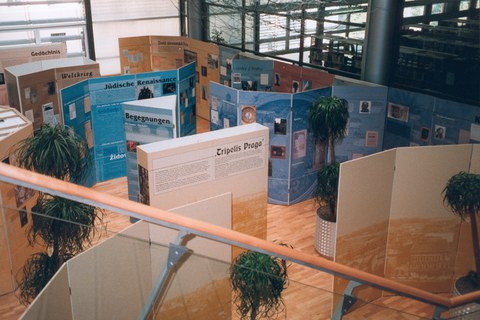Prague Modernism
"Tripoli Praga"
Prague Modernism. An exhibition

Präsentation in Liberec
The first heyday of 'Prague Modernism' ends with the collapse of the Habsburg Empire and the proclamation of the Czechoslovak Republic. The protagonists of Prague literature such as Max Brod, Franz Werfel, Egon Erwin Kisch and even Franz Kafka leave Prague and settle in German-speaking countries, especially Berlin. Prague then became a center of modernism once again in the 1930s, as the traditionally bilingual Czechoslovakia offered itself as a country of refuge for German exiles and also cultivated an open policy of exile. This "second Prague Modernism" was destroyed in 1939; however, it was subject to different framework conditions than the "first", which also had a more lasting impact on public perception. In order not to overload the project, we will concentrate primarily on this "first" phase.
Here, three chronological sections divide the almost unmanageable material.
The 1890s are characterized by the emergence of modernism. In close contact with Czech authors, young German and German-Jewish writers received and productively appropriated the international avant-garde movement. "Rene Rilke's Prague years" (Peter Demetz) are exemplary here.
Around 1910, a recognizable group of German-language authors formed in Prague. Unlike in other centers of modernism, the generational community in this relatively small circle is so strong that the usual internal divisions do not prevail. They all hang out in the same cafés, they meet in changing constellations in private settings without forming a circle. Rather, this "Prague Modernism" could be described as a network, which incidentally also opened up to the Czech literary scene. This German-Czech cultural community becomes tangible in Kafka's famous partnership with Milena Jesenská. However, beyond biographical coincidences, the exhibition will focus on the simultaneous emergence of Czech artists and writers into European modernism; the diverse connections in the daily communication of the various groups will be made clear for the first time in our exhibition.
After 1914, the group of "Prague Modernists" broke up rather quickly, initially due to military service or the avoidance of it. After 1918, the now famous German-speaking protagonists of the pre-war literary scene left the city and moved to more attractive centers, which now opened up better opportunities for them as German-speaking authors.
Catalog
"Tripoli Praga. Prague Modernism around 1900". Catalog book
Edited by Walter Schmitz and Ludger Udolph. Dresden: Thelem bei w.e.b.-Universitäts-Verlag, 2001.
(Central European Studies, Volume 5). ISBN 3-933592-91-7
The exhibition catalog takes us back to the tri-national city of Prague around 1900. It presents the nationality struggles in the dawn of modernity up to the upheaval of 1918 - the culture of the Germans, Czechs and Jews in their cooperation and opposition and in their efforts to mediate and create a new humanity.
"Prague Modernism," writes Václav Havel in his greeting to this volume, "is a broad term that encompasses many names, styles and forms. A colorful, courageous, tolerant and innovative time. At the same time a time full of mysterious corners, full of sadness, incomprehension and alienation, loudly expressing the experience of the seemingly legitimate absurdity of the world. A time that draws our attention to meaningless and mechanized contexts and thus invites us to move, to experience them more intensely".
The bilingual exhibition has now been presented at over ten locations, including:
- Dresden, 1999-2001
- Liberec, June/July 2001
- Olomouc, November 2002
- Ostrava, December 2002
- Erfurt, March/April 2003
- Leipzig, February 2004
- Chemnitz, July 2004
- Bautzen, July/August 2008
- Prague, August 2008 (see also: http://www.radio.cz/de/rubrik/kultur/die-ausstellung-tripolis-praga-zeigt-das-prager-kulturleben-um-1900)
- Jihlava (Gustav Mahler House), May/June 2013
- Friedrichshafen: Lake Constance Festival (Graf-Zeppelin-Haus), April 25-May 25, 2015, see: http://bodenseefestival.de/2015/04/tripolis-praga/
Press
haGalil onLine (magazine): http://www.hagalil.com/archiv/2003/11/prag.htm
Radio Prague: http://www.radio.cz/de/artikel/46788
